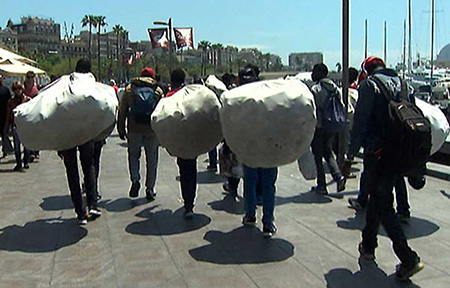A theoretical model allows detecting the degree of discrimination of political discourse on immigration
A theoretical model allows detecting the degree of discrimination of political discourse on immigration
Its authors, Ricard Zapata-Barrero and Gema Rubio-Carbonero, GRITIM-UPF researchers, explain this analytical framework and its application in Catalonia, in an article recently published in the online version of the journal Discourse & Society.
An article written by two researchers of the GRITIM-UPF research group presents the results of an analytical framework designed to monitor discriminatory political discourse about immigration that they have implemented in Catalonia, based on a pilot study, during the period from 2007 to 2012. As one of its authors, Ricard Zapata-Barrero explains, “The Council of Europe has already contacted us to study potential applications in the EU based on this model”.
 Ricard Zapata-Barrero, along with Gema Rubio Carbonero, lecturers with the Department of Political and Social Sciences and researchers of the Interdisciplinary Research Group on Immigration (GRITIM) at UPF, have recently published this article online in the journal Discourse & Society. To perform their research, the authors combined three main disciplines to interpret the construction of discriminatory discourse: political science, social psychology and discourse studies (critique).
Ricard Zapata-Barrero, along with Gema Rubio Carbonero, lecturers with the Department of Political and Social Sciences and researchers of the Interdisciplinary Research Group on Immigration (GRITIM) at UPF, have recently published this article online in the journal Discourse & Society. To perform their research, the authors combined three main disciplines to interpret the construction of discriminatory discourse: political science, social psychology and discourse studies (critique).
This first exploratory pilot study, which was funded by the Open Society Foundation, is based on a total of 66 documentary sources, which include electoral programmes and campaigns (May 2007 and from 2011 regarding municipal elections, and November 2010 and 2012, with regard to regional elections), plenary activities and interviews with politicians of six different parties: CIU, ERC, ICV-EUiA, PPC, PSC and PXC (Platform for Catalonia, one of the first Spanish anti-immigration political parties). This period was marked by the Government of the triumvirate (PSC, ERC and ICV-EUiA) in Catalonia, and by the mandate of Jordi Hereu (PSC) in the city of Barcelona.
Other goals of the study are, on the one hand, to create a social and political impact, which will serve as a tool to identify and quantify discriminatory political discourse, in addition giving conceptual resources to the civil society to monitor the discursive behaviour of political parties; and on the other, to establish a conceptual framework that could be applicable in other contexts, in different countries and political environments.
Main results of the pilot study carried out in Catalonia
The pilot study concludes that, in global terms, there is no evidence of consistent widespread discriminatory discourse in the Catalan political discourse analysed. However, it displays some features that represent immigration in a negative way. In this sense, political discourse is not always directed at the population as a whole, but only at “national” citizens, and some polarizations are observed between national citizens and immigrants.
In addition, some strategies that negatively represent immigration, or certain groups of immigrants have been seen, especially as a threat or a burden to the host society, as well as being present in the discourse of generalizations and hyperbolas that maximize and deal with the phenomenon of immigration as a problem.
Finally, although there is not a negative perception of immigrants, an implicit discriminatory tendency has been detected in nationalist discourse that prioritizes distinct identity, culture and the nation in most of the discourse, without knowing, however, whether this is done intentionally or unconsciously.
Analysing whether a political discourse is discriminatory based on twelve different levels
The study by the UPF researchers aims to analyse whether a political discourse is discriminatory (or not) through twelve levels or rules, which are divided into three stages: certifying if the political discourse is systematically discriminatory; if it is, to quantify it; and finally, to evaluate how this discourse is legitimated or justified.
The first phase (certification of discriminatory discourse) includes three levels: if the speech, in global terms, explicitly or implicitly addresses national citizens or the population as a whole; if there is polarization between the national citizens and immigrants; and, if there are any recurring semantic strategies (generalizations, hyperbolas, etc.) that present immigration negatively (for example, talking about “illegal or irregular immigrants”, or presenting the arrival of immigrants as “waves”).
The second stage (quantification of discriminatory discourse), would no longer need applying it in the Catalan case, as it was not certified as discriminatory, but the analysis was carried out in any case. This section refers to seven different rules: if the countries of origin are mentioned in negative contexts; if there are implicit or explicit references to preferences among the countries of origin; if positive or negative values are associated with immigration and diversity (a high frequency of negative values associated with immigration was detected); immigration as a phenomenon conceptualized with positive (opportunity or challenge), negative (problem) or neutral connotations.
The other levels of this second stage are as follows: which are the most common political areas and problems in which immigration is framed and how are they constructed: if they are neutral (integration), negative (insecurity, social conflict, etc.) or positive (immigration as an opportunity), which is the predominant one in Catalonia; and the global representation of immigrants (as a threat, as beneficiaries –the most widespread- as aggressors or as benefactors).
Finally, in the last stage (evaluation of the rhetoric of discourse: legitimation and justification of policies and attitudes based on issues of diversity), there are two levels, which refer to the type of discursive rhetoric used (argumentative, manipulative, etc.), and finally, whether a conservative or populist rhetoric is used, features that are present in the Catalan discourse, even though they are not predominant.
Reference article: Ricard Zapata-Barrero, Gema Rubio Carbonero (January, 2017): “Monitoring discriminatory political discourse on immigration: A pilot study in Catalonia”, Discourse & Society (SAGE Journals). DOI: https://doi.org/10.1177/0957926516685464
